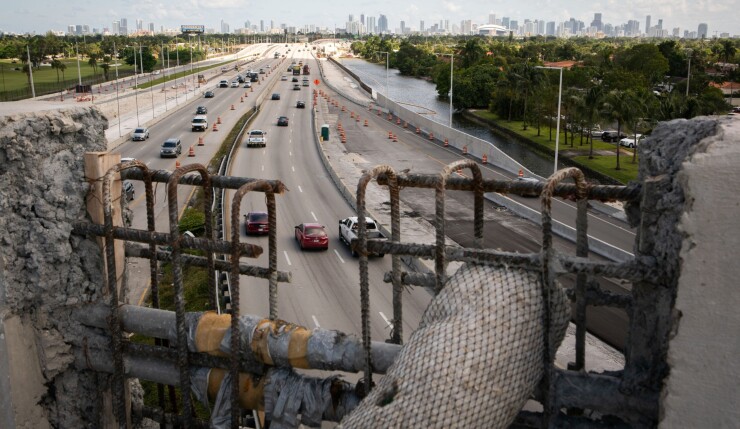Florida's attempt to dissolve the Miami-Dade County Expressway Authority continues as the state filed its first brief in an appeal of a lower court ruling.
In August 2019, Leon County Circuit Judge John Cooper ruled that a bill to dissolve the toll road authority, known as MDX, violated Florida's constitution because it preempted Miami-Dade County's home rule power by using a special local law that pertained only to the county.

Among FDOT’s arguments disputing Cooper's ruling, the state’s transportation agency contends in a new appeal brief that House Bill 385 signed by Gov. Ron DeSantis on July 3, 2019, affects all Florida counties by repealing their power to form an expressway authority under the Florida Expressway Authority Act.
HB 385 "does not violate Miami-Dade’s home rule charter because it is a general law that relates to Miami-Dade County and at least one other county, and, in fact, relates to all counties," said
The brief does not specify the "other county" to which HB 385 applies.
An attorney familiar with Florida's expressway systems, who asked not to be identified by name, said he didn't know what other county FDOT was referring to, and the issue might be questioned by the appellate judges.
The law attempting to dissolve MDX also created a replacement agency, called the Greater Miami Expressway Agency, or GMX. When DeSantis signed the bill, he made his three appointments to the new board of directors, while the local FDOT district secretary automatically became a voting member of the board.
Other members of the GMX board haven’t been appointed, including three by the Miami-Dade Transportation Planning Organization and two by the Miami-Dade County Commission.
FDOT's brief contends that HB 385 "empowers GMX, like MDX before it, to enter into an agreement with any county to construct and operate an expressway system in that county."
The law "does address roads that are part of the State Highway System, and empowers GMX to construct and operate an expressway system in any county by agreement with that county," the brief said. The law "does not implicate Miami-Dade County’s home rule charter because GMX has the same powers in all Florida counties."
The attorney who asked not to be identified said he considers that a “specious argument.”
The MDX was created in 1994 by the Miami-Dade County Commission to operate five major expressways within the county's boundaries.
The toll roads operated by the MDX are the Airport Expressway, also known as State Road 112, the Dolphin Expressway or SR 836, the Don Shula Expressway or SR 874, the Snapper Creek Expressway or SR 878, and the Gratigny Parkway or SR 924.
Those authority’s toll roads are frequently used by local commuters, and rising toll rates became an issue. However, the county also has a larger network of toll roads operated by FDOT and the Florida Turnpike Enterprise.
Rep. Bryan Avila, R-Miami Springs, and other local politicians backed legislation aimed at making changes in the MDX.
Avila, who sponsored HB 385 in 2019, told fellow members on the House floor before the chamber voted that the MDX and its board of directors had “let the community down” by refusing to reduce toll rates even though the agency had followed previous mandates to do so.
The final bill passed in May 2019.
While HB 385 dissolved the MDX and replaced it with a new board and executive director, the law ordered the new governing board to concentrate on reducing toll rates. It also imposed state oversight of bond issuance.
The MDX filed a lawsuit challenging the 2019 law as well as legislation passed in 2017 and 2018 contending, among other things, the laws violated the state constitution, which prohibits the Legislature from passing bills or special acts that only apply to Miami-Dade County, and that the laws violated the prohibition on impairing the contractual trust indentures for its bonds.
The MDX had $1.407 billion of outstanding debt as of June 30, 2019, according to its comprehensive annual financial report.
After HB 385 was signed, the MDX revenue bonds' credit ratings were downgraded, with some analysts citing the unprecedented “interference” of the Legislature into an agency that previously had the exclusive right to budget and set toll rates.
The bonds are rated A3 by Moody's Investors Service and A by S&P Global Ratings. Both have negative outlooks.
On Feb. 20, Fitch Ratings downgraded the MDX’s bonds to BBB-plus from A-minus, and revised its Negative Rating Watch to a negative outlook.
“The downgrade to BBB-plus reflects the continued legal uncertainty surrounding the authority's governance structure and the ambiguity in regards to strategic direction and oversight during the course of the potentially lengthy legal proceedings,” said Fitch analyst Stacey Mawson.
“The lack of clarity regarding the legal outcome and management of the expressway authority has resulted in it operating without a board of directors, thereby limiting the full functionality of operations and limiting its capital planning and investment strategy,” Mawson added.
If legal proceedings remain unresolved and affect the authority's liquidity or maintenance of assets, additional rating pressure may occur, Fitch said.
“Clarity regarding the makeup and functionality of the board, along with assurance that the authority will continue to maintain its solid financial profile, would stabilize the rating at its current level,” Mawson said, adding, “Fitch will continue to monitor the situation and incorporate future material credit events as they arise. "
On Oct. 7, 2019, FDOT and the Florida House of Representatives filed for a writ of prohibition in an attempt to have the lower court's case heard by Judge Cooper tossed out.
On Oct. 10, 2019, FDOT and the House filed an appeal of Cooper’s ruling in which he found that MDX had standing and capacity to file suit, that FDOT was a proper party to sue, and that while GMX may have been a proper party to the litigation it was “not an indispensable party.”
The filing of both cases brought stays that have prevented the MDX board of directors from meeting and taking action on the agency’s work plan and budget.
The First District Court of Appeal heard oral arguments in the writ of prohibition case on March 10. On June 26, the appellate court denied requests by FDOT and the House for a writ.
"A writ of prohibition is not warranted where there is an adequate remedy at law," wrote Judge Ross L. Bilbrey for the court. "Petitioners have not demonstrated that their pending appeal is not an appropriate remedy to address the denial of their defenses that MDX lacks standing to bring the causes of action filed below and that FDOT is not a proper party to the declaratory action."
The appeal is now proceeding as case No. 19-3653.
MDX’s attorneys have asked the court to lift the stay and allow the board of directors to resume normal board meetings in order to make operational and budget decisions.





